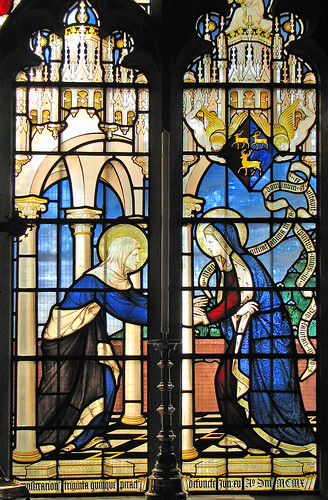The song of Hannah - quoted in part in today's responsorial psalm - had a profound influence on Mary's song, the Magnificat, which we hear in the Gospel. Both these songs, spoken under the inspiration of the Spirit by women who are miraculously pregnant, are themselves pregnant with God's promise. Significantly, although the liturgical text does not cite this, Hannah ends her prayer with these words: "The Lord will judge the ends of the earth; he will give strength to his king, and exalt the power of his anointed." As we know, this promise is fulfilled in the child - the Son of the Most High - whom the Virgin Mary carries in her womb, and the Spirit who has opened Hannah's womb also opens her lips to speak her words of praise and prophecy. Every evening the same Spirit opens the lips of Holy Mother Church as she sings with one voice and for all ages, the hope-filled words of Mary who is the Church's "type and excellent exemplar in faith and charity" (Lumen Gentium, 53).
While Hannah's words are anticipatory, Mary's Magnificat is in a tense that indicates something already accomplished. As we sing these words each day and recall that still the rich and powerful lord it over the humble and meek, we may rightly wonder how it is that Mary's song (which is not, as some might be tempted to think, a socio-political manifesto) can be in the past tense?
Hannah certainly looked forward to the Christ child, the Redeemer promised to her people, but Mary and we, the Church, who are her children, have already entered into that long awaited promise. Unlike Hannah we no longer await Christ but rather, through our baptism, we have been reborn in the Spirit and become members of Christ's Body, the Church. It is this blessing that the Church is empowered to bear to all people. As Pope Benedict XVI has said: "When you [Mary] hastened with holy joy across the mountains of Judea to see your cousin Elizabeth, you became the image of the Church to come, which carries the hope of the world in her womb across the mountains of history."
However, like a pregnant woman, we Christians live not so much in anticipation of a promise but in hope, allowing the Spirit to fulfill in our lives that promise already accomplished in Christ. As St Paul says: "creation waits with eager longing for the revealing of the children of God" (Romans 8:19). Therefore, the Holy Father also said in his second encyclical, Spes Salvi, that hope "is the expectation of things to come from the perspective of a present that is already given. It is a looking-forward in Christ's presence, with Christ who is present, to the perfecting of his Body, to his definitive coming." Rooted in the first coming of Christ but looking forward to His return in glory - an event that would complete the prophecy in Hannah's song - Advent is thus pregnant with this essential dynamic of Christian hope. And this blessed hope founded upon faith in Christ is the most loving Christmas present we could give to those around us.

I don't think the Magnificat is a manifesto either. I suppose I think that it's a hymn to the event that unfolds at the meeting point between Christ and the world. I think that the meeting between Christ and the world can be understood by us in many ways. I can't see a reason to prohibit the expression of a 'socio-political' perspective on this event nor indeed to deny that Magnificat can be - in part - understood to treat of the transformative reality of Christ's coming into the world from this perspective.
ReplyDeleteAll the joy of the season to you, LL, and to all those whose work produces this remarkable blog.